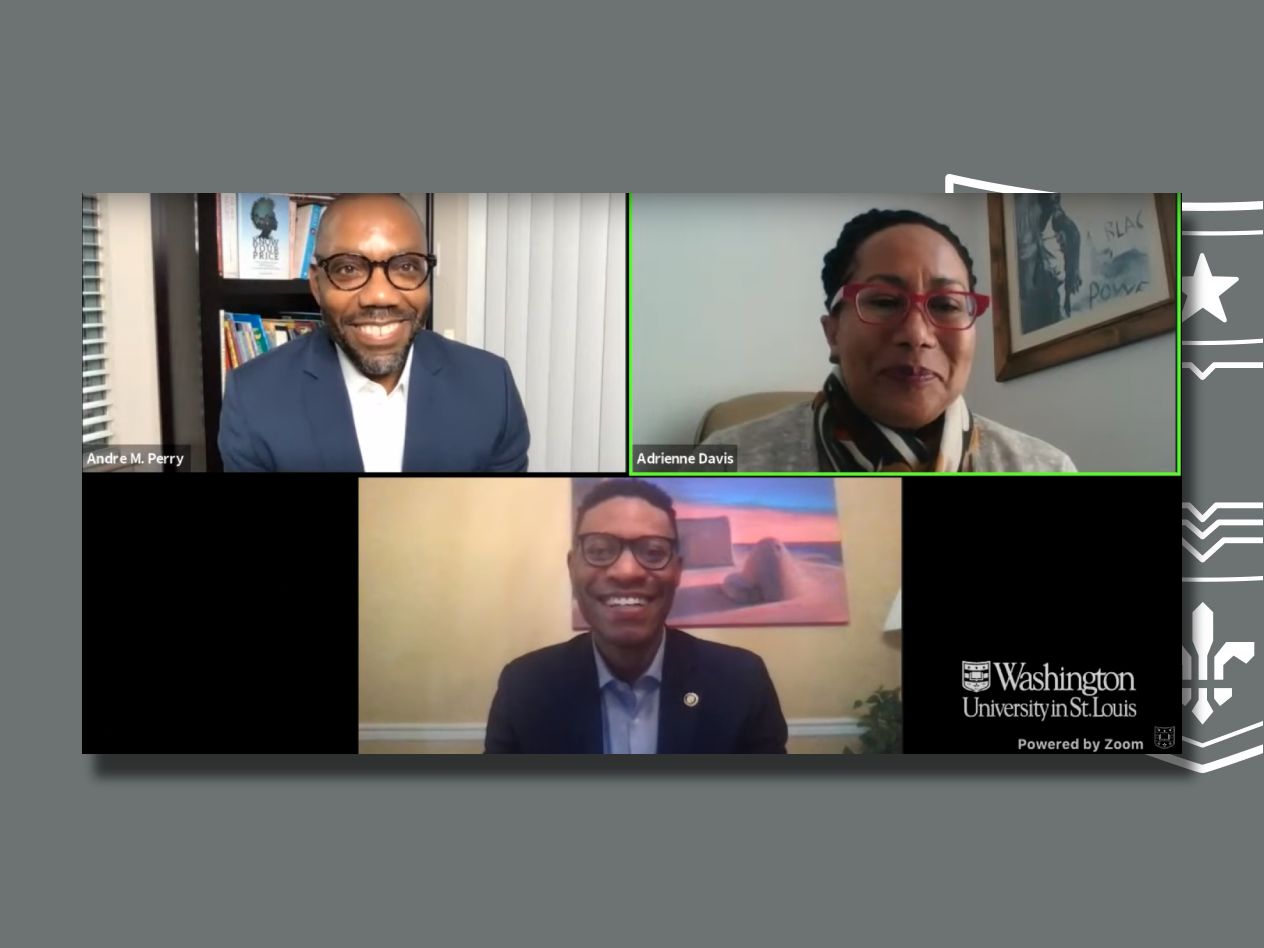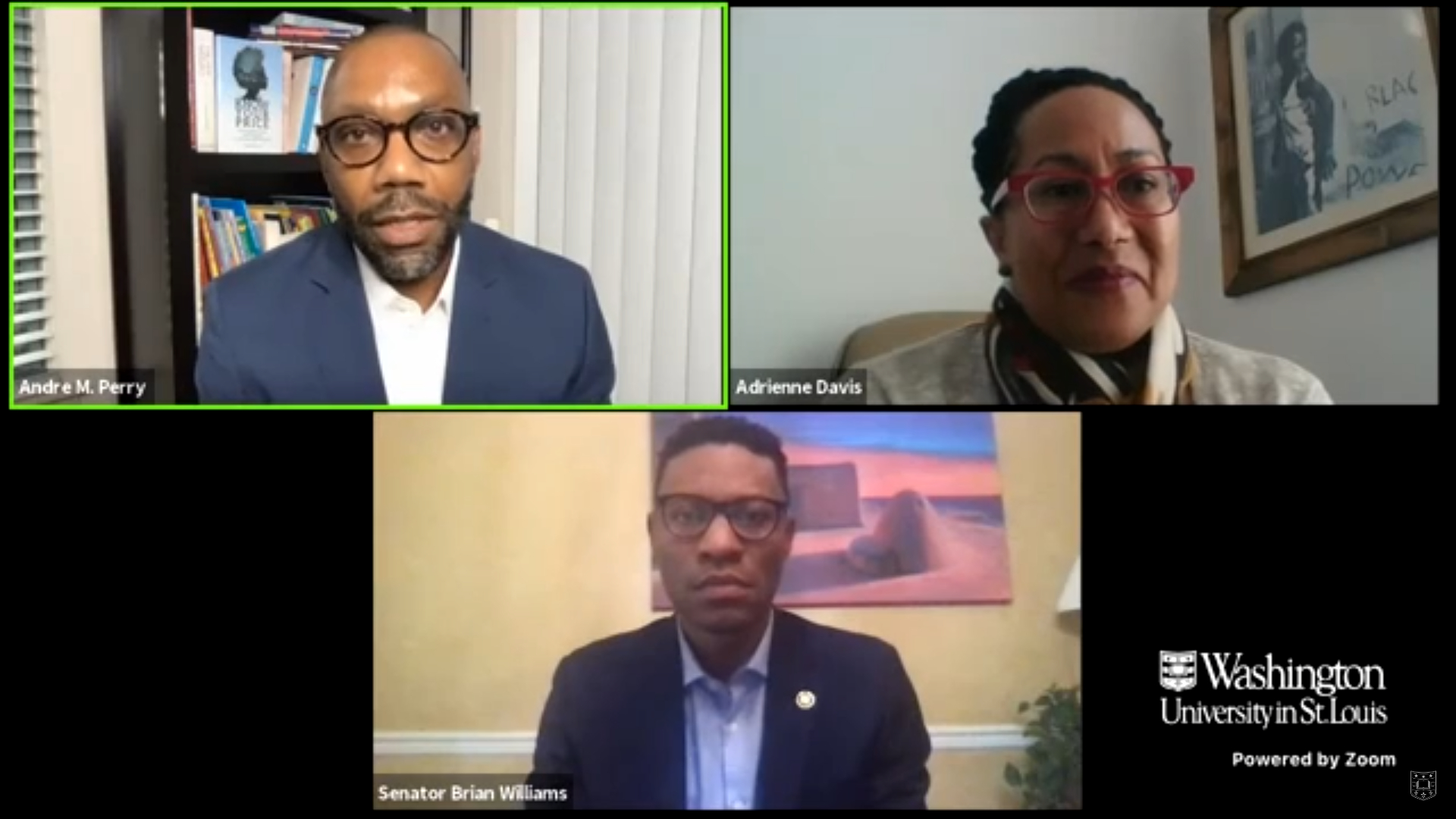WashU at Brookings panel explores historical, economic roots of racial crisis
- August 31, 2020
- By Molly Cruitt
- 3 minute read

On a Zoom webinar attended by more than 200 individuals, moderator Adrienne Davis, vice provost and director of the Center for the Study of Race, Ethnicity & Equity at Washington University, set the tone for an evening of frank and honest discussion on race.
Davis reminded attendees of the upcoming 65-year anniversary of the murder of Emmett Till at the hands of white supremacists.
Moments earlier, Dean Mark Taylor had introduced the evening with a nod to Jacob Blake, a Black man shot several times by police officers in Kenosha, Wisconsin, and who lay in a hospital as the panelists spoke—one of countless recent victims of state-sanctioned racial violence.
So began the WashU at Brookings-hosted event, “From Ferguson to Minneapolis: Where do we go from here?” a conversation on race, values and equity in light of current events. Moderated by Davis, the event featured Missouri State Sen. Brian Williams and Brookings Institution fellow Andre Perry.
Sixty-five years after Emmett Till’s death, we’re in the middle of this long summer of Black death. How did we get here?
—Vice Provost Adrienne Davis
Williams represents Missouri district 14, part of St. Louis County. He is a member of multiple committees and serves as a board director for People’s Health Center, where he helped develop a behavioral healthcare center for children in underserved communities.
Perry is a fellow in the Metropolitan Policy Program at Brookings. A nationally known commentator on race, structural inequality and education, he is the author of “Know Your Price: Valuing Black Lives and Property in America’s Black Cities.” Perry is a regular contributor to MSNBC and has been published by The New York Times, The Nation, The Washington Post, TheRoot.com and CNN.com.
‘It’s personal to me’
The conversation was far from theoretical; Perry and Williams both shared their own experiences with racial profiling. “If I take off this pin,” Williams said, gesturing to the lapel pin indicating his status as a state senator, “I’m no different than George Floyd, or Michael Brown.”
Perry agreed, sharing, “This is an ongoing conversation I have with my child, with myself. This is something that’s become a 400-year long epidemic, plaguing our communities.”
The theme of an epidemic echoed throughout the evening; Williams asserted that “racism, like COVID-19, is a virus that has yet to eradicate itself.”
Rooted in data
In addition to sharing historical information that contextualized the state of racial tension in the United States, Perry and Williams looked to concrete examples of the present-day roots of racism, and how those roots expand beyond racist attitudes or policing.
“This issue is bigger than police,” said Perry. “There’s nothing that says a Black person doesn’t belong in the economy more than a police officer snuffing his life out. That’s a values statement—and I’m glad we’re having this conversation in a business school. You can’t separate social and economic issues of racism: these attitudes are shared throughout all of society. They just look different.”
Perry cited statistics from his new book—including a study that controlled for education, crime and walkability—and found that homes in Black neighborhoods are undervalued by about 23% in the United States.
Looking to the future
When Davis asked what disparities each panelist would solve if they were given a magic wand, their answers were immediate. For Perry, it would be economic justice—which includes reparations, “not just because of the wealth it would create, but because it’s morally the right thing to do. We’re owed that money.”
Williams focused on education: “I would fully invest our public education system to ensure that everyone has a fair opportunity for a quality education.”
Though the topic was tough, the evening inspired hope for a brighter future. “I’m feeling hope in a way I haven’t before,” said Perry. “What’s new right now, is I’m seeing young people of different races and people from around the world demanding change.”
William shared his plans for a comprehensive police reform bill, introduced as Senate bill 16 in the Missouri legislature—and reminded viewers of their civic duty. “It’s time to turn that energy into action—and we do that at the ballot box. This isn’t about you or me. It’s about the future we want for our families and communities.”
Perry encouraged participants to get involved with an organization focused on racial justice—and make realistic steps toward making a difference. “Being remarkable isn’t about you—it’s about joining a remarkable movement.”
From Ferguson to Minneapolis: Where do we go from here?
WashU Olin and WashU at Brookings host an important discussion about race, values and education through the lens of today's current events.
Media inquiries
For assistance with media inquiries and to find faculty experts, please contact Washington University Marketing & Communications.
Monday–Friday, 8:30 to 5 p.m.
Sara Savat
Senior News Director, Business and Social Sciences

